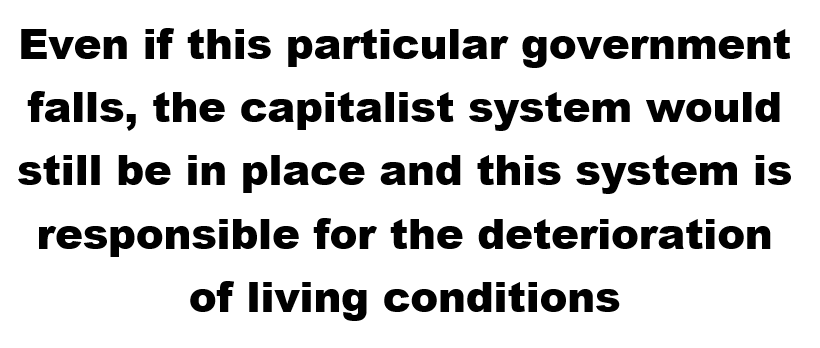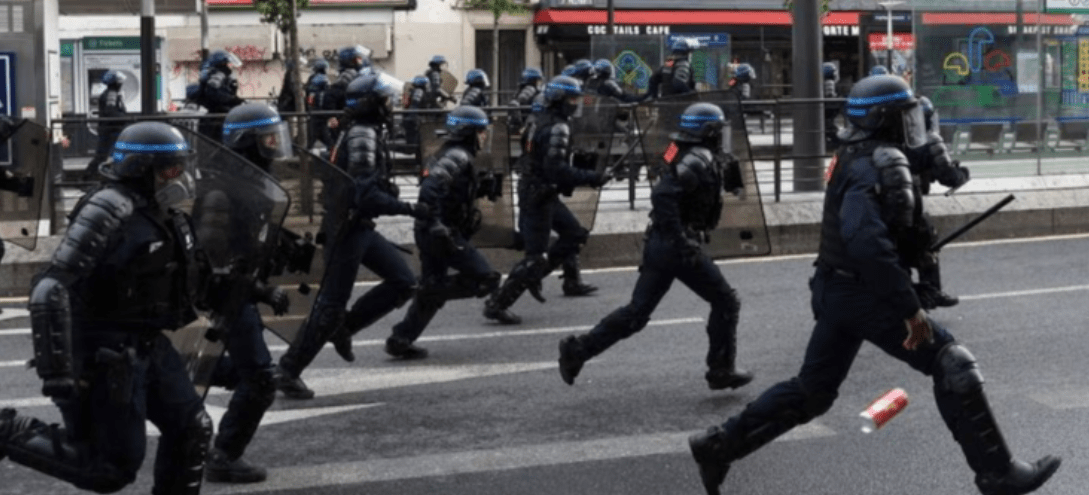By Gauthier Hordel
[Note: a provision in the French state constitution, Subsection 3 (Article 49.3), allows the government to force passage of a bill through the Assembly, without a vote, unless the parliament votes a vote de censure motion of no confidence]
Since the forced passage of the pension reform, using article 49.3, the protest movement against pension reform has entered a new phase. The fight and the anger have intensified in the face of Macron’s utter contempt for the workers.
In eleven months, the government of Elizabeth Borne has used 49.3 eleven times. If the others went almost unnoticed, this time, because of public opinion being overwhelmingly against the pension reform, it threw oil on the fire.
The attitude of the government testifies to its weakening. In the last legislative elections, Macron did not achieve an overall majority, being the largest party in the National Assembly, and this forced his government to find allies on the side of LR (The Republicans, Macron’s party] to get bills passed. However, even a number of LR deputies have spoken out against the reform.
Who will pay – the capitalists or the workers?
The Republicans have always been in favour of raising the retirement age and extending the contribution period. The problem of financing the pension fund is who will pay: capital or the workers? The LR deputies are, like Macron, fierce defenders of the interests of capitalism. The opposition to the reform by some LR deputies is purely opportunist and for electoral purposes, but it still poses a problem for the government, which is trying to force the reform through.
The strategy the government used was a high-risk one, but one that has given added momentum to the opposition. Since the use of the 49.3 provision there have been blockades, mostly organized by the CGT [trade union federation], and spontaneous demonstrations have multiplied. Many youth have also entered the struggle.
On the days of action, March 24 and 28, there was clearly great anger and it is not just about pension reform: it is a profound anger that has accumulated since the pandemic and is now in the context of economic crisis and inflation. Food and energy prices are rising alarmingly.
Capitalism no longer has any perspective to offer workers and youth other than cuts in living standards. The interests of the capitalists come first and the mass of the population must bear the hardships. The pension reform is the straw that broke the camel’s back. With this reform, Macron is following the interests of the capitalist class and in what is a highly flammable situation, it has fanned the flames.
Successive days of action cannot go on indefinitely
Against the reform plan there has been a large-scale social mobilisation, the strongest elements essentially confined to sectors well organised by the CGT, such as port dockworkers, refineries, garbage collectors, SNCF [railways] and EDF [energy]. The workers in these sectors are carrying on the fight but will not be able to hold on indefinitely.
The successive days of action, as important as they are, are not enough to break the government. For that to happen, it would be necessary that for the strikes to be widened to other sectors of the economy.
It is this slogan that the CGT must carry forward. To bring significantly more workers into the fight, the demands of the CGT should not be limited to the issue of pensions. They must have a more general character, to take into account the prevailing mood and to open up the prospect of an offensive against the capitalist system.

Even if this particular government falls, the capitalist system will still be in place and if this system is responsible for the deterioration of living conditions, then there is no choice but to question it. For decades, and regardless of their political labels, various governments have, willingly or by force, followed a policy based on the interests of capitalism. It is a class which has been able to impose policy in its own interests even in the current parliament where there is a minority government.
The opposition has taken on a broadly political character
The first phase of the fight against the pension reform was largely based around the labour movement, but since the use of Article 49.3, it has taken on a more broadly political character. Slogans and demands need to be adapted to this new situation, highlighting the need for a change of the whole political and economic regime, for a truly democratic republic, that serves the interests of the majority of the population, that is that is, of the working class.
This means that the big majority of the means of production and exchange should be nationalised and put under the democratic control of the workers. The absolutely legitimate anger against Macron’s anti-democratic methods and the entry of young people into the movement – and the context of general uprising – have created a situation favourable to the emergence of revolutionary ideas.
A strategy directly attacking the power of capitalism would offer real prospects for workers and youth, unlike the shared initiative referendum advocated by the NUPES parliamentarians. [NUPES is an alliance of left-wing parties in the National Assembly.] The referendum could turn out to be nothing but a trap, because not only does it confine the fight to the single question of pension reform, but it offers Macron and the capitalist class – in a potentially revolutionary situation – a way to stay in power at the cost of a few concessions.
Macron calling for discussions
A social explosion is happening now! Both the government and the trade union federations know it. Macron and his government are now calling for discussions on issues other than pensions. Laurent Berger [General Secretary of the CFDT union federation] is rushing to respond favourably, to discuss with the government, while asking for mediation. These are expressions of fear from both sides, because they are aware that they are sitting on a volcano!
Macron’s isolation means that he is intensifying the use of repression to quell the protests. As it was with the yellow vests, the government uses “legal” violence to intimidate: with beatings, arbitrary arrests and requisitions of refinery workers. Demonstrators are considered “enemies of the republic“. The mainstream media, mostly at the service of the capitalist class, strives to discredit the movement, pointing a finger at the “violence” of some demonstrators.
Protesters can only count on themselves to ensure their own safety and that of young people, in the face of police violence and the trade unions are the best placed to carry out that function. But we have to prepare seriously.
The parliamentary activities of left-wing deputies can play a certain role, but given the composition of the National Assembly, it is necessarily limited. The outcome of the struggle will depend on the evolution of extra-parliamentary mobilisations, in the streets and in the workplaces, and it also depends on the political consciousness of the workers. Workers need to become aware of their own strength and ability to strike decisive blows against this government and the capitalist system it represents.
Based on the article in the French Marxist website, La Riposte. The original can be found here.



